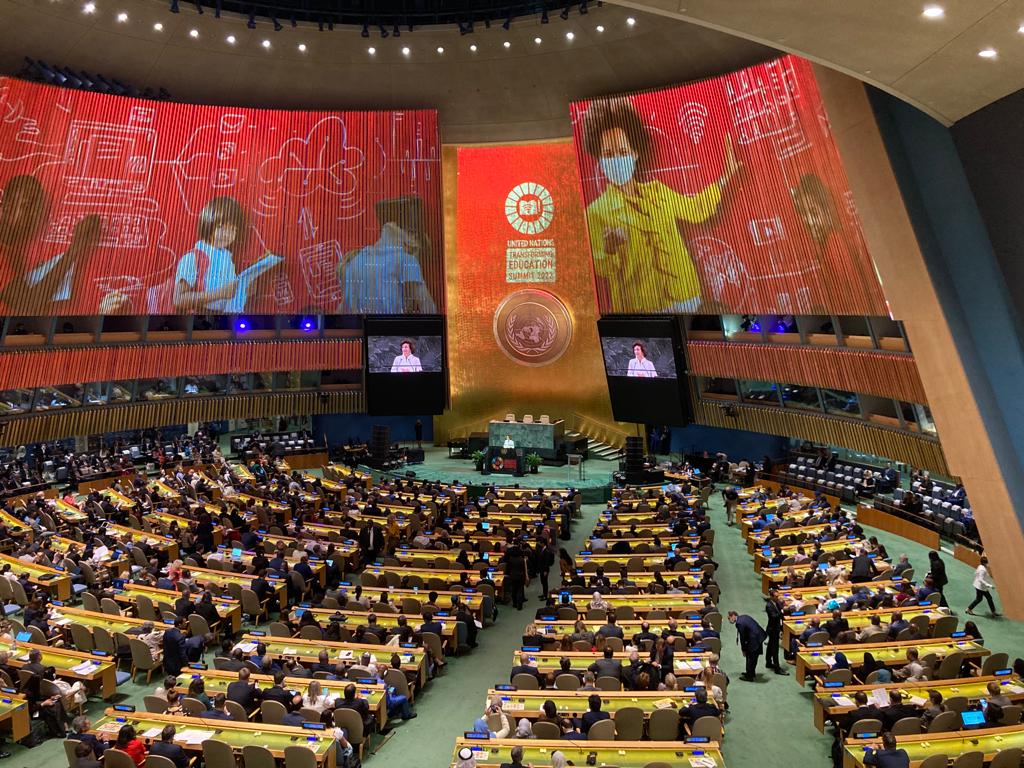
BIG 6 YOUTH ORGANISATIONS WELCOME KEY OUTCOMES FROM THE TRANSFORMING EDUCATION SUMMIT
As the United Nations General Assembly meets for the first time in three years, education reform is at the top of the agenda. Over three days, young people, policy makers, civil society organisations, governments and leaders came together to debate, discuss, and prioritise actions as part of the Transforming Education Summit.
The Summit highlighted young people’s, civil society’s and international organisations’, collective sense of urgency to address the global education crisis alongside interconnected global challenges such as the COVID-19 pandemic, the climate crisis, a mental health crisis, growing inequality and conflict. As António Guterres, Secretary General of the UN said, we must move from an age of consultation to an age of shared responsibility.
The Global Youth Mobilization (GYM), along with our partners from across the Big 6 Youth Organisations *, welcome the following developments from the Summit:
- ‘We, the youth of the world’. The significance of the Youth Declaration, and placing a youth voice and perspective at the centre of education reform is critical. As António Guterres, Secretary General of the UN said, we must move from an age of consultation to an age of shared responsibility. The Youth Declaration and commitment to youth-led decision making is a key first step.
- Scale-up of education financing. The launch of the new International Finance Facility for Education (IFFEd) is a powerful new tool for financing global education. We look forward to working with the Education Commission and others to advocate for more funding and focus on quality, inclusive, and accessible education for all, especially girls, and young people with disabilities.
- Multi-sectoral partnership focus with education as the enabler. If we are to address the world’s biggest issues, from climate change, poverty, gender equality, human rights, mental health, and more, we must prioritise education in its entirety (including formal and non formal education pathways). The Summit has helped to re-emphasise the role of education as the key enabler for achieving the 2030 Sustainable Development Goals.
- Focus on life skills, global citizenship, leadership and transferable skills. The Summit clearly demonstrated the need to focus on life skills, global citizenship, leadership and transferable skills to meet the needs of young people. The Big 6 organisations (and the members they represent) lead on developing types of skills and experiences through volunteering, for, by, and with, youth worldwide.
Whilst non-formal education and learning was not on the Transforming Education Summit agenda, the Big Six Youth Organisations were present and proud to advocate on behalf of the 250 million young people we support across 192 countries for the practical, youth-led and skills-based learning opportunities we provide as an essential complement to formal education.
As outlined in the Rio Declaration, authored and signed at the World Non-Formal Education Forum in 2019, more needs to be done to recognize non-formal education as a key component of comprehensive education, including funding commitments and partnerships.
Dr. Helga Mutasingwa, Global Youth Mobilization Youth Board Representative, World Association of Girl Guides and Girl Scouts, said:
“To develop good, transformational and quality education for every young person, we must recognise the important role of non-formal education in enabling young people to take action to bring about positive change in the communities.
We have seen young people taking the lead in communities during the time of COVID and using non-formal education to support other young people for greater impact.”
Anna Segall, CEO of the World Association of Girl Guides and Girl Scouts and Chair of the Global Youth Mobilization, said:
« The Transforming Education Summit represents a key milestone for the importance of youth-led decision making, youth voice and the role of young people in shaping our world. As we move forward, we must not overlook the importance of non-formal education and learning for young people. Working in collaboration with our Big 6 partners, we are calling for clear action and increased resourcing rather than warm words. We must ensure that education systems are built which provide everyone, particularly girls and young women, with the skills they need to thrive in the future. »
As we look beyond Transforming Education and towards 2030, we will continue to work with young people, partners, and governments, to advance the Sustainable Development Goals and achieve real change with, by, and for young people worldwide.
*The Big 6 is made up of the: World Young Men’s Christian Association (WYMCA); World Young Women’s Christian Association (WYWCA); World Organisation of the Scout Movement (WOSM) ; World Association of Girl Guides and Girl Scouts (WAGGGS); International Federation of Red Cross and Red Crescent Societies (IFRC); and The Duke of Edinburgh’s International Award (The Award).
Together, the Big 6 actively involve and engage more than 250 million young people, contributing to the empowerment of more than one billion young people during the last century.
